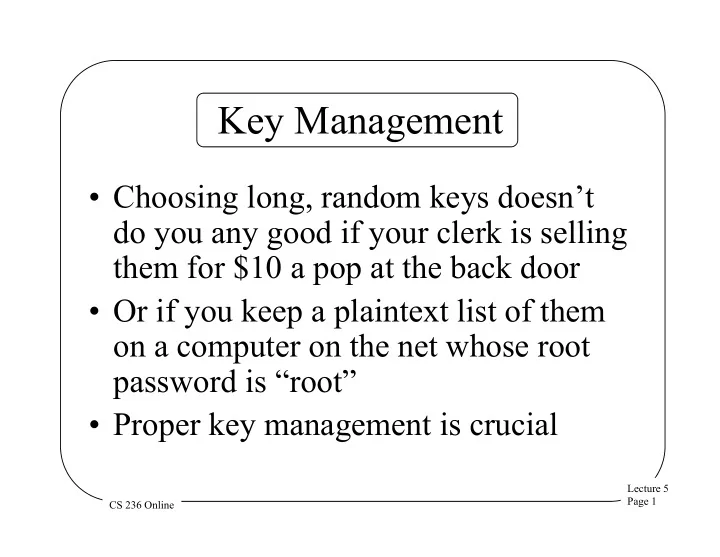

Key Management • Choosing long, random keys doesn’t do you any good if your clerk is selling them for $10 a pop at the back door • Or if you keep a plaintext list of them on a computer on the net whose root password is “root” • Proper key management is crucial Lecture 5 Page 1 CS 236 Online
Desirable Properties in a Key Management System • Secure • Fast • Low overhead for users • Scaleable • Adaptable – Encryption algorithms – Applications – Key lengths Lecture 5 Page 2 CS 236 Online
Users and Keys • Where are a user’s keys kept? • Permanently on the user’s machine? – What happens if the machine is cracked? • But people can’t remember random(ish) keys – Hash keys from passwords/passphrases? • Keep keys on smart cards? • Get them from key servers? Lecture 5 Page 3 CS 236 Online
Key Servers • Special machines whose task is to generate, store and manage keys • Generally for many parties • Possibly Internet-wide • Obviously, key servers are highly trusted Lecture 5 Page 4 CS 236 Online
Security of Key Servers • The key server is the cracker’s holy grail – If they break the key server, everything else goes with it • What can you do to protect it? Lecture 5 Page 5 CS 236 Online
Security for Key Servers • Don’t run anything else on the machine • Use extraordinary care in setting it up and administering it • Watch it carefully • Use a key server that stores as few keys permanently as possible – At odds with need for key storage • Use a key server that handles revocation and security problems well Lecture 5 Page 6 CS 236 Online
Single Machine Key Servers • Typically integrated into the web browser – Often called key chains or password vaults • Stores single user’s keys or passwords for various web sites • Usually protected with an overall access key • Obvious, encrypted versions stored on local disk Lecture 5 Page 7 CS 236 Online
Security Issues for Single Machine Key Servers • Don’t consider one that doesn’t store keys encrypted • Issues of single sign-on – If computer left unattended – In case of remote hacking • Anything done by your web browser is “you” Lecture 5 Page 8 CS 236 Online
Local Key Servers • Can run your own key server machine – Stores copies of all keys you use • Possibly creates keys when needed • Uses careful methods to communicate with machines using it • E.g., Sun StorageTek Crypto Key Management System Lecture 5 Page 9 CS 236 Online
Key Storage Services • Third party stores your keys for you – In encrypted form they can’t read • ANSI standard (X9.24) describes how third party services should work • Not generally popular • HyperSafe Remote Key System is one example • Variants may become important for cloud computing Lecture 5 Page 10 CS 236 Online
The Dark Side of Key Storage • Governments sometimes want your crypto keys • Since they might not be able to read your secret data without them • They’d often prefer you didn’t know they asked . . . • Key escrow services can allow this Lecture 5 Page 11 CS 236 Online
Key Escrow, Clipper, and Skipjack • In the 1990s, US government tried to mandate key escrow – For encrypted network communications • Based on a new cipher (Skipjack) • Implemented in a special chip (Clipper) Lecture 5 Page 12 CS 236 Online
Basic Idea Behind Clipper • Encrypted messages would carry special information • Privileged parties could use it to retrieve the crypto key used • Governments would be among those parties • But, of course, they’d never abuse it . . . Lecture 5 Page 13 CS 236 Online
What Happened to Clipper? • Totally fried by academic security community – Experts united in their scorn for both idea and particular implementation • Chips were built • Nobody used them • The idea is now dead, but . . . • British PM Cameron just revived it (Jan 2015) – Attractive but bad ideas never disappear forever Lecture 5 Page 14 CS 236 Online
The NSA and Key Services • Snowden revelations have shown that the NSA frequently goes after keys • Will commercial key escrow services give keys to the NSA? • If not, will the NSA try to get them, anyway? • Key servers are a big, fat target for folks like the NSA Lecture 5 Page 15 CS 236 Online
Recommend
More recommend